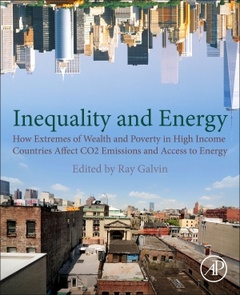Description
Galvin - Economic Inequality and Energy Consumption in Developed Countries
How Extremes of Wealth and Poverty in High Income Countries Affect CO2 Emissions and Access to Energy
Coordinator: Galvin Ray
Language: English
Subjects for Galvin - Economic Inequality and Energy Consumption in...:
360 p. · 19x23.3 cm · Paperback
Description
/li>Contents
/li>Readership
/li>Biography
/li>Comment
/li>
Inequality and Energy: How Extremes of Wealth and Poverty in High Income Countries Affect CO2 Emissions and Access to Energy challenges energy consumption researchers in developed countries to reorient their research frameworks to include the effects of economic inequality within the scope of their investigations, and calls for a new set of paradigms for energy consumption research. The book explores concrete examples of energy deprivation due to inequality, and provides conceptual tools to explore this in relation to other issues regarding energy consumption. It thereby urges that energy consumption approaches be updated for a world of increasing inequality.
Extreme economic inequality has increased within developed countries over the past three decades. The effects of inequality are now seen increasingly in health, housing affordability, crime and social cohesion. There are signs it may even threaten democracy. Researchers are also exploring its effects on energy consumption. One of their key findings is that less privileged groups have lost consistent access to basic energy services like warm homes and affordable transport, leading to huge disparities of climate damaging emissions between rich and poor.
PART 1 Theory and concepts: Bringing economic inequality into energy research
CHAPTER 1 Recent increases in inequality in developed
Ray Galvin
CHAPTER 2 What is money? And why it matters for social science in energy research
Ray Galvin
CHAPTER 3 Asymmetric structuration theory: A sociology for an epoch of extreme economic inequality
Ray Galvin
CHAPTER 4 Economic inequality, energy justice and the meaning of life
Ray Galvin
PART 2 Empirical findings: Energy and economic inequality in practice
CHAPTER 5 Energy poverty: Understanding and addressing systemic inequalities
Lucie Middlemiss
CHAPTER 6 Housing tenure and thermal quality of homes—How home ownership affects access to energy services
Nicola Terry
CHAPTER 7 Cold homes and Gini coefficients in EU Countries
Ray Galvin
CHAPTER 8 Why are women always cold? Gendered realities of energy injustice
Minna Sunikka-Blank
CHAPTER 9 Inequality and renewable electricity support in the European Union
Lawrence Haar
CHAPTER 10 Energy poverty research: A perspective from the poverty side
Ray Galvin
PART 3 Reflections
CHAPTER 11 Sustainable energy transition and increasing complexity: Trade-offs, the economics perspective and policy implications
Reinhard Madlener
CHAPTER 12 Can economic inequality be reduced? Challenges and signs of hope in 2019
Danny Dorling
- Provides overwhelming evidence of the persistent and increasing income inequality and wealth inequality in developed countries over the past three decades
- Showcases recent empirical work that explores correlates of this inequality with energy consumption behavior and some of the key problems of access to adequate energy services
- Shows the connections between these findings and the existing ways of researching energy consumption behavior and policy
These books may interest you

Red Sea Geothermal Provinces 142.04 €

Red Sea Geothermal Provinces 56.31 €


